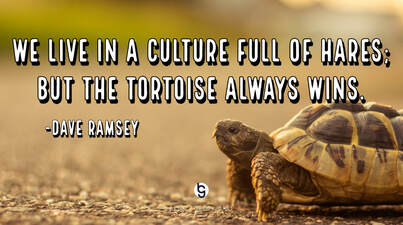The Turtle Always Wins“Speed kills” is a common saying in sport. Fans, scouts, and coaches will reference it in recruiting or as justification for why one athlete, or team, outperforms another. Quickness, athleticism, or ‘speed’ have a significant impact on performance.
In the short term, they’re right - the hare will win. But, in the long term, that’s not the case. In the long term, the turtle always wins. Regardless of society’s compulsion for honoring number one, the first, or the fastest; the reality doesn’t change. Patience and persistence are going to win out. Why not recognize it and operate as if we know it now? Why Should We Care? When we know the turtle wins, our perspective is shifted. The persistent failure becomes the superstar. The young, complacent hot shot becomes the underachiever. The faithful worker focused on the mundane masters the essentials. The flippant genius is bored by the very skills that hold his future success. As leaders, we must always be aware of what we are rewarding. The behaviors we promote within our team establishes the culture of our group. It’s culture that kills, not speed. How we see success is also a significant factor on what we view as worthy of praise. The more bent we are towards achieving outcomes, the more likely we are to value speed over persistence. The faster we can get the result we want, regardless of what is compromised, makes the most sense, right? A process focus is naturally accompanied by an expectation, and acceptance of, patience. Of course there is a desire for the instant gratification, the sugar rush, of the immediate result. However, the process focused mind realizes any success, or failure, is simply a by-product of the process chosen. Furthermore, a seemingly good result doesn’t always equate to the best process anymore than a seemingly bad result equates to a poor process. Both are yet to be seen, meaning there is more work to do either way. Turtles believe in, and do, the work. REAL TALK - Action Steps This is a pretty easy one to understand and even acknowledge, but very difficult to remember in the moment. Here are a few ideas for bringing the patient persistence of the turtle to the forefront.
Appreciating the way of the turtle is important for us as individuals and organizations alike. Both parties like to cite their need for immediate results as their excuse for a lack of emphasis on the long game. It’s a lame excuse, stop using it. Give the turtle the respect it deserves. For more information on building excellence in your teams, visit us at www.bluecollargrit.com. We would love to know how we could help!
0 Comments
Leave a Reply. |
About bcI'm a teacher, coach, and parent seeking excellence while defining success on my own terms. Archives
April 2024
Categories |


 RSS Feed
RSS Feed